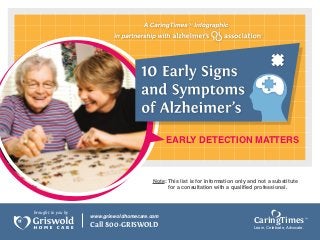
10 Early Signs and Symptoms of Alzheimer's Disease
- 1. EARLY DETECTION MATTERS Note: This list is for information only and not a substitute for a consultation with a qualified professional. brought to you by www.griswoldhomecare.com Call 800-GRISWOLD CaringTimes Learn, Celebrate, Advocate.
- 2. Have you noticed any of these early warning signs of Alzheimer's? 1. Memory loss that disrupts daily life One of the most common signs of Alzheimer’s, especially in the early stages, is forgetting recently learned information. Others include forgetting important dates or events; asking for the same information over and over; relying on memory aides (e.g., reminder notes or electronic devices) or family members for things they used to handle on their own. Sometimes forgetting names or appointments, What’s Typical? but remembering them later. brought to you by www.griswoldhomecare.com Call 800-GRISWOLD CaringTimes Learn, Celebrate, Advocate.
- 3. 2. Challenges in planning or solving problems Some people may experience changes in their ability to develop and follow a plan or work with numbers. They may have trouble following a familiar recipe or keeping track of monthly bills. They may have difficulty concentrating and take much longer to do things than they did before. Making occasional errors when balancing What’s Typical? a checkbook. brought to you by www.griswoldhomecare.com Call 800-GRISWOLD CaringTimes Learn, Celebrate, Advocate.
- 4. 3. at work orcompleting familiar tasks at home, Difficulty at leisure People with Alzheimer’s often find it hard to complete daily tasks. Sometimes, people may have trouble driving to a familiar location, managing a budget at work or remembering the rules of a favorite game. Occasionally needing help to use the settings What’s Typical? on a microwave or to record a television show. brought to you by www.griswoldhomecare.com Call 800-GRISWOLD CaringTimes Learn, Celebrate, Advocate.
- 5. 4. Confusion with time or place People with Alzheimer's can lose track of dates, seasons and the passage of time. They may have trouble understanding something if it is not happening immediately. Sometimes they may forget where they are or how they got there. Getting confused about the day of the week What’s Typical? but figuring it out later. brought to you by www.griswoldhomecare.com Call 800-GRISWOLD CaringTimes Learn, Celebrate, Advocate.
- 6. 5. spatial relationships visual images and Trouble understanding For some people, having vision problems is a sign of Alzheimer's. They may have difficulty reading, judging distance and determining color or contrast. In terms of perception, they may pass a mirror and think someone else is in the room. They may not recognize their own reflection. What’s Typical? Vision changes related to cataracts. brought to you by www.griswoldhomecare.com Call 800-GRISWOLD CaringTimes Learn, Celebrate, Advocate.
- 7. 4. 6. New problems with words Confusion with time or place in speaking or writing People with Alzheimer's may have trouble following or joining a conversation. They may stop in the middle of a conversation and have no idea how to continue or they may repeat themselves. They may struggle with vocabulary, have problems finding the right word or call things by the wrong name (e.g., calling a watch a "hand clock"). Sometimes having trouble finding the What’s Typical? right word. brought to you by www.griswoldhomecare.com Call 800-GRISWOLD CaringTimes Learn, Celebrate, Advocate.
- 8. 7. Misplacing thingssteps losing the ability to retrace and A person with Alzheimer’s disease may put things in unusual places. They may lose things and be unable to go back over their steps to find them again. Sometimes, they may accuse others of stealing. This may occur more frequently over time. Misplacing things from time to time, such as a What’s Typical? pair of glasses or the remote control. brought to you by www.griswoldhomecare.com Call 800-GRISWOLD CaringTimes Learn, Celebrate, Advocate.
- 9. 8. Decreased oror writing 6. New problems with words in speaking poor judgment People with Alzheimer's may experience changes in judgment or decision making. For example, they may use poor judgment when dealing with money, giving large amounts to telemarketers. They may pay less attention to grooming or keeping themselves clean. What’s Typical? Making a bad decision once in a while. brought to you by www.griswoldhomecare.com Call 800-GRISWOLD CaringTimes Learn, Celebrate, Advocate.
- 10. 9. Withdrawal from work or social activities A person with Alzheimer's may start to remove themselves from hobbies, social activities, work projects or sports. They may have trouble keeping up with a favorite sports team or remembering how to complete a favorite hobby. They may also avoid being social because of the changes they have experienced. Sometimes feeling weary of work, family and What’s Typical? social obligations. brought to you by www.griswoldhomecare.com Call 800-GRISWOLD CaringTimes Learn, Celebrate, Advocate.
- 11. 6. New problems writing personality 10.inChanges inor and with words speaking mood The mood and personalities of people with Alzheimer's can change. They can become confused, suspicious, depressed, fearful or anxious. They may be easily upset at home, at work, with friends or in places where they are out of their comfort zone. Developing very specific ways of doing things and What’s Typical? becoming irritable when a routine is disrupted. brought to you by www.griswoldhomecare.com Call 800-GRISWOLD CaringTimes Learn, Celebrate, Advocate.
- 12. A special thanks to the If you have questions about any of these warning signs, the Alzheimer’s Association recommends consulting a physician. Early diagnosis provides the best opportunities for treatment, support and future planning. For more information, go to alz.org/10signs or call 800.272.3900 ©2012 Alzheimer’s Association. All rights reserved. Used with permission. brought to you by www.griswoldhomecare.com Call 800-GRISWOLD CaringTimes Learn, Celebrate, Advocate.
